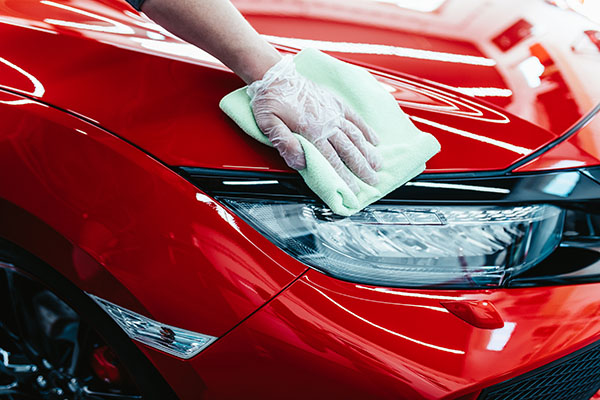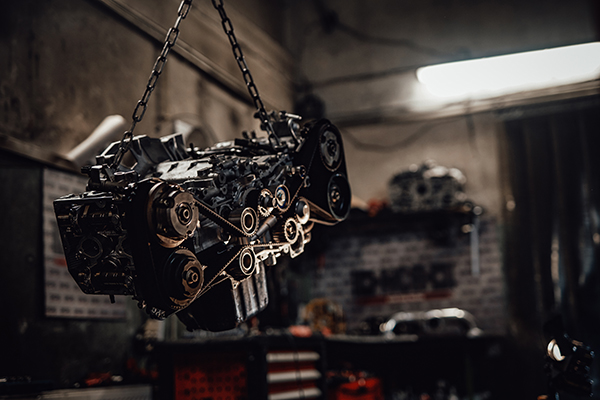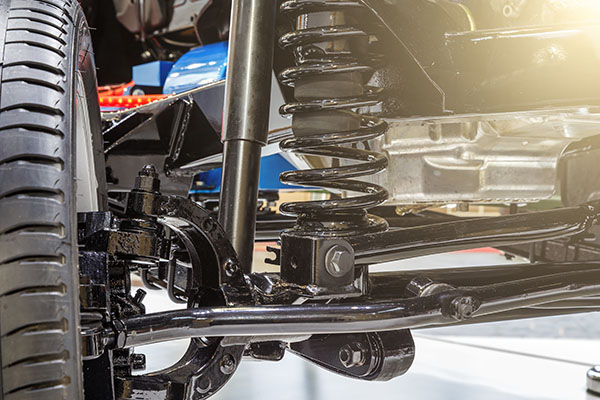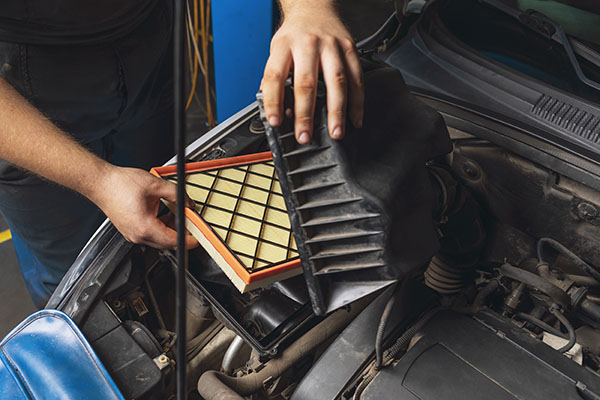Posted on 12/25/2023

As you gaze upon the sleek lines and luxurious curves of a Mercedes-Benz, your eyes may be drawn to a badge that signifies more than just elegance—it's the herald of unparalleled performance. The AMG emblem, proudly displayed on select Mercedes-Benz models, is a symbol that ignites the hearts of driving enthusiasts. The AMG Legacy Affalterbach, Germany, is where the magic begins. AMG, short for "Aufrecht, Melcher, and Großaspach" (the names of the founders and Aufrecht's birthplace), started as an independent engineering and tuning firm. Their partnership with Mercedes-Benz began in the 1990s, birthing a collaboration that would redefine luxur ... read more
Posted on 11/30/2023
.jpeg)
Even the most luxurious vehicles need a bit of hands-on care to keep purring like a well-tuned symphony. In today's Mercedes-focused guide, we'll take you on a journey under the hood, exploring the simple yet crucial task of changing the oil filter. It's a small DIY project, so don't worry! Step 1: Gather Your Tools and Materials Before diving into the oil filter change, ensure you have all the necessary tools and materials. You'll typically need an: Oil filter wrench Drain pan Socket set New oil filter designed for model. Additionally, having a pair of gloves and some old newspapers or rags handy is always a good idea to keep things clean. Step 2: Locate the Oil Filter The oil filter on most Mercedes-Benz models is usually located near the bottom of the engine. Consult your owner's manual for the exact location, a ... read more
Posted on 10/30/2023
.jpeg)
Embarking on the thrilling journey of finding the perfect Mercedes-Benz model from the vast array of options can be as exhilarating as it is daunting - especially if we are talking about the used/second-hand market. With the badge of Mercedes-Benz comes the promise of luxury, performance, and unrivaled craftsmanship. As we delve into the world of these masterfully engineered vehicles, let's unravel the gems that have withstood the test of time, ensuring both excellence and dependability for those who seek nothing less than the pinnacle of automotive sophistication. Mercedes-Benz E-Class - E350 and E550 (2003-2009 One of the outstanding champions of the Mercedes-Benz fleet, the E-Class, specifically the E350 and E550 models, crafted between 2003 and 2009, continues to stand tall as an embodiment of enduring luxury and reliability. Boasti ... read more
Posted on 9/29/2023

We've all been there – the dreaded moment when your check engine light flickers to life, and your heart sinks at the thought of another unexpected car repair bill. But fear not because, at MB Clinic Inc., we believe that keeping your car in top shape doesn't have to drain your wallet. By choosing a reasonably priced auto service shop and mastering the art of budgeting, you can face those auto repairs with confidence. Consider Past Expenses Budgeting – a skill that's essential for everyone's financial well-being. When it comes to budgeting for your specific car make and model and your unique driving habits, taking a look at your past spending is the first step. With this information in hand, you can plan how much to set aside for car maintenance in the months ahead. Begin by tracking down your previous receipts or credit card statements from auto service visits. This should include expenses like oil changes, tire services ... read more
Posted on 8/31/2023

When it comes to luxury and sophistication, Mercedes-Benz has always held a prominent place in the automotive world. While some might associate the brand with high-end luxury vehicles, Mercedes has cleverly bridged the gap between opulence and affordability with their impressive lineup. One notable gem in this category is the Mercedes CLA. So, is the CLA the best affordable sedan Mercedes offers? Let's answer this question together and explore the reasons why the CLA shines as an accessible gateway into the world of luxurious driving. Sleek and Stylish Aesthetics The Mercedes CLA is a head-turner, there's no doubt about it. Its design echoes the marque's elegance while adding a youthful and sporty flair. From its distinctive front grille to the sweeping roofline, the CLA stands out with its unique silhouette that blends classic luxury with modern aesthetics. Innovative Technology Mercedes has i ... read more
Posted on 7/31/2023

The suspension system of a vehicle plays a critical role in providing a smooth and comfortable ride, as well as ensuring stability and control on the road. Among the various types of suspension systems available, spring suspension and air suspension stand as two popular choices. Let's see the main reasons why they are so popular, their function, and their specifications - continue reading to find out more. Spring SuspensionSpring suspension is the conventional and widely used suspension system found in most vehicles. It consists of coil springs or leaf springs, which are strategically positioned between the vehicle's chassis and its wheels. When encountering bumps or road irregularities, the springs compress and absorb the impact, effectively minimizing the shocks and vibrations felt by the passengers. Here are the advantages and disadvantages it offers:Simplicity ... read more
Posted on 6/30/2023

As the temperature rises and the sun shines brighter, summer brings a host of challenges for our vehicles. One often overlooked aspect of summer car maintenance is the timely replacement of filters. While filters may seem like small and insignificant components, they play a crucial role in keeping your car running smoothly during the scorching summer months. In this blog, we'll explore why changing filters in your car is essential to beat the summer heat and maintain optimal performance. 1. Air Filter: Breath of Fresh Air The air filter in your car prevents dust, pollen, debris, and other contaminants from entering the engine's combustion chambers. During summer, when roads are dusty and pollen counts are high, the air filter can quickly become clogged. A dirty air filter restricts airflow, reducing engine performance and fuel efficiency. Regularly replacing the air filter ensures proper air intake, allowing your engine to breathe freely and operate at its be ... read more
Posted on 5/31/2023

When it comes to racing legends, the Mercedes-Benz CLS GTR holds a prominent place in automotive history. Born out of the desire to dominate the racetrack, the CLS GTR represents the pinnacle of performance, innovation, and engineering excellence. If you want to learn a little bit more about this marvel of engineering, make sure to continue reading! The Birth of a Champion The Mercedes-Benz CLS GTR traces its origins back to the early 1990s when Mercedes-Benz made a triumphant return to motorsports. The goal was to create a competitive racing machine that would dominate the GT racing scene. With a team of engineers, designers, and aerodynamic experts, the journey to create the CLS GTR began. The CLS GTR's racing legacy is etched in history with an impressive track record of victories. It has conquered renowned endurance races and championships, leaving competitors in its wake. The car's exceptional performance, reliability, and the skill of the drivers behin ... read more
Posted on 4/29/2023

When it comes to luxury sedans, the Mercedes-Benz S-Class has long been regarded as the epitome of automotive excellence. With its impeccable craftsmanship, advanced technology, and unparalleled comfort, the S-Class continues to set the standard for luxury vehicles. Let's take a closer look at three standout models that have left an indelible mark on the automotive industry.#1 Mercedes-Benz S-Class 580 (W223)The 2021 Mercedes-Benz S-Class 580 4MATIC is the peak of luxury and performance. Under the hood, it boasts a powerful 4.0-liter V8 engine that delivers an impressive 496 horsepower and 516 lb-ft of torque. This engine is paired with a smooth and responsive 9-speed automatic transmission, providing seamless acceleration and effortless cruising. With its advanced all-wheel drive system, the S-Class 580 4MATIC offers excellent traction and stability, ensuring a confident driving experience in any road condition. Whether the luxurious ... read more
Posted on 3/24/2023

Mercedes-Benz Sprinter vans have become increasingly favored in recent years for commercial use, and it's not hard to see why. These versatile vans offer a range of features that make them stand out from other commercial vehicles. So what makes the Sprinter so special? Durability Mercedes-Benz Sprinter vans are built to last. They're designed to handle heavy loads, rough terrain, and demanding conditions, making them a reliable choice for commercial use. Customization Sprinter vans are highly customizable, with a range of options available for different types of businesses. Whether you're looking for a cargo van or a passenger van, there's a Sprinter model that can be tailored to your specific needs. Fuel Efficiency Sprinter vans are known for their fuel efficiency, with some models getting up to 22 miles per gallon on the highway (which is considered great for a duty vehicle). This makes them an affordable option for businesses that require a lot of driving. Saf ... read more